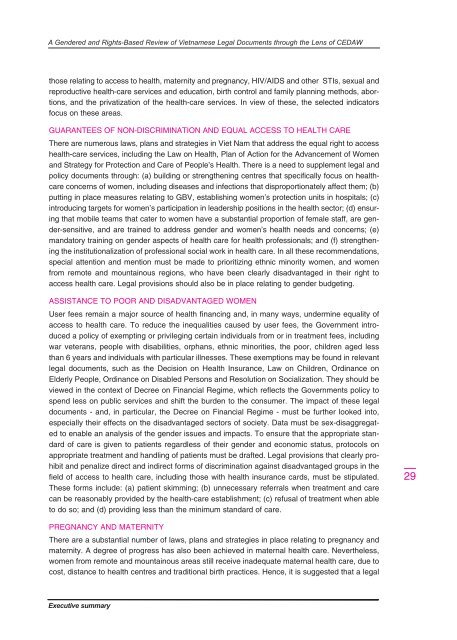English - CEDAW Southeast Asia
English - CEDAW Southeast Asia
English - CEDAW Southeast Asia
You also want an ePaper? Increase the reach of your titles
YUMPU automatically turns print PDFs into web optimized ePapers that Google loves.
A Gendered and Rights-Based Review of Vietnamese Legal Documents through the Lens of <strong>CEDAW</strong><br />
those relating to access to health, maternity and pregnancy, HIV/AIDS and other STIs, sexual and<br />
reproductive health-care services and education, birth control and family planning methods, abortions,<br />
and the privatization of the health-care services. In view of these, the selected indicators<br />
focus on these areas.<br />
GUARANTEES OF NON-DISCRIMINATION AND EQUAL ACCESS TO HEALTH CARE<br />
There are numerous laws, plans and strategies in Viet Nam that address the equal right to access<br />
health-care services, including the Law on Health, Plan of Action for the Advancement of Women<br />
and Strategy for Protection and Care of People’s Health. There is a need to supplement legal and<br />
policy documents through: (a) building or strengthening centres that specifically focus on healthcare<br />
concerns of women, including diseases and infections that disproportionately affect them; (b)<br />
putting in place measures relating to GBV, establishing women’s protection units in hospitals; (c)<br />
introducing targets for women’s participation in leadership positions in the health sector; (d) ensuring<br />
that mobile teams that cater to women have a substantial proportion of female staff, are gender-sensitive,<br />
and are trained to address gender and women’s health needs and concerns; (e)<br />
mandatory training on gender aspects of health care for health professionals; and (f) strengthening<br />
the institutionalization of professional social work in health care. In all these recommendations,<br />
special attention and mention must be made to prioritizing ethnic minority women, and women<br />
from remote and mountainous regions, who have been clearly disadvantaged in their right to<br />
access health care. Legal provisions should also be in place relating to gender budgeting.<br />
ASSISTANCE TO POOR AND DISADVANTAGED WOMEN<br />
User fees remain a major source of health financing and, in many ways, undermine equality of<br />
access to health care. To reduce the inequalities caused by user fees, the Government introduced<br />
a policy of exempting or privileging certain individuals from or in treatment fees, including<br />
war veterans, people with disabilities, orphans, ethnic minorities, the poor, children aged less<br />
than 6 years and individuals with particular illnesses. These exemptions may be found in relevant<br />
legal documents, such as the Decision on Health Insurance, Law on Children, Ordinance on<br />
Elderly People, Ordinance on Disabled Persons and Resolution on Socialization. They should be<br />
viewed in the context of Decree on Financial Regime, which reflects the Governments policy to<br />
spend less on public services and shift the burden to the consumer. The impact of these legal<br />
documents - and, in particular, the Decree on Financial Regime - must be further looked into,<br />
especially their effects on the disadvantaged sectors of society. Data must be sex-disaggregated<br />
to enable an analysis of the gender issues and impacts. To ensure that the appropriate standard<br />
of care is given to patients regardless of their gender and economic status, protocols on<br />
appropriate treatment and handling of patients must be drafted. Legal provisions that clearly prohibit<br />
and penalize direct and indirect forms of discrimination against disadvantaged groups in the<br />
field of access to health care, including those with health insurance cards, must be stipulated.<br />
These forms include: (a) patient skimming; (b) unnecessary referrals when treatment and care<br />
can be reasonably provided by the health-care establishment; (c) refusal of treatment when able<br />
to do so; and (d) providing less than the minimum standard of care.<br />
29<br />
PREGNANCY AND MATERNITY<br />
There are a substantial number of laws, plans and strategies in place relating to pregnancy and<br />
maternity. A degree of progress has also been achieved in maternal health care. Nevertheless,<br />
women from remote and mountainous areas still receive inadequate maternal health care, due to<br />
cost, distance to health centres and traditional birth practices. Hence, it is suggested that a legal<br />
Executive summary

















